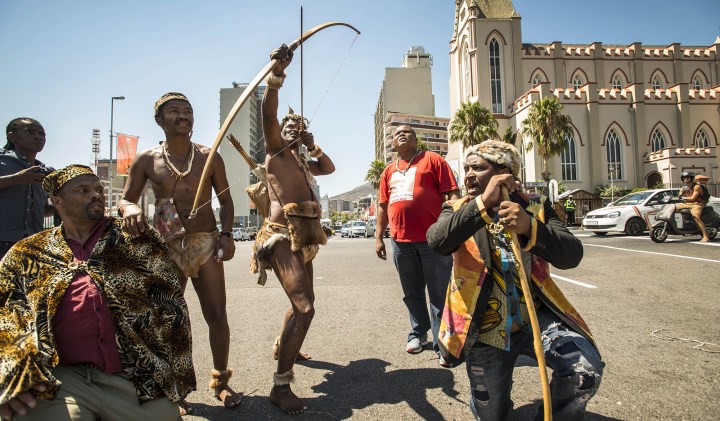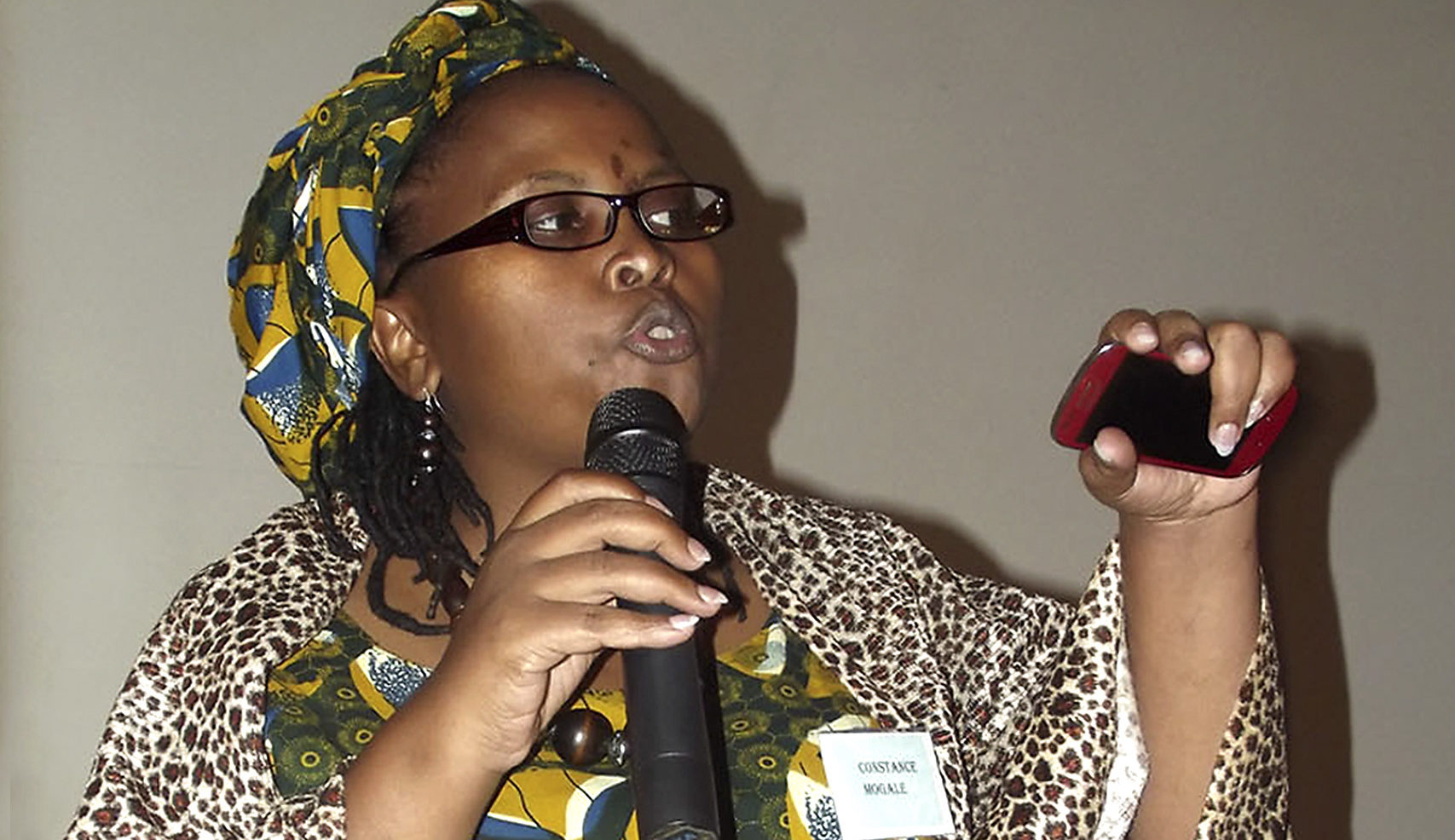CONSTITUTIONAL COURT
‘Major victory’ — activists and civil society hail judgment declaring Traditional and Khoi-San Leadership Act invalid

The judgment, said one activist, ‘brought hope for the rural masses, and courage to scream louder in defence of rural democracy, irrespective of how hard the rural voices are ignored by Parliament.’
The Constitutional Court, in a unanimous judgment on Tuesday, ruled that the Traditional and Khoi-San Leadership Act is unconstitutional.
According to the judgment, Parliament “overwhelmingly failed in facilitating public participation” before passing the Traditional and Khoi-San Leadership Act (TKLA). The judgment, penned by Judge Leona Theron, gave Parliament 24 months to re-enact the law “in a manner that is consistent with the Constitution” or to pass a fresh law.
The application was brought by Constance Mogale, the national coordinator of the Alliance for Rural Democracy; the Land Access Movement of South Africa; Mashona Wetu Dlamini, a member of the Umgungundlovu community in Xolobeni, Eastern Cape; and Victor Modimakwane, a member of the Bakgatla ba Kgafela community in North West.

Constance Mogale, the national coordinator of the Alliance for Rural Democracy. (Photo: Land Movement of South Africa)
The TKLA was introduced to Parliament in 2015, with the promise to recognise the Khoi-San people and their leaders, a move that was widely supported.
However, it drew criticism from civil society organisations, women’s groups and opposition parties for various reasons, including that the law enables dispossession without consent, entrenches the boundaries of the old Bantustans and unconstitutionally strengthens traditional councils.
From 2016 to 2018, a public participation process was conducted by the National Assembly and provincial legislatures to gather feedback on the proposed law. The Alliance for Rural Democracy, which initiated the Stop the Bantustan Bills Campaign in 2018, argued that the public participation processes were marred by several issues. These included:
- Late announcements of hearings;
- Last-minute venue changes;
- Venues were far from rural communities;
- No copies of the bill were available at many hearings;
- Copies of the bill were available in English only;
- The bill was advertised as affecting only Khoi-San communities; and
- The voices of traditional leaders dominated some hearings.
Despite warnings by some civil society groups, President Cyril Ramaphosa signed the bill into law in November 2019, and the act came into effect on 1 April 2021.
The applicants applied directly to the Constitutional Court for an order declaring that Parliament, the National Council of Provinces and the provincial legislatures failed to fulfil their constitutional obligations to facilitate reasonable public involvement in the passing of the Traditional and Khoi-San Leadership Act 3 of 2019.
Read more in Daily Maverick: Traditional and Khoi-San Leadership Act challenged in Constitutional Court
Tuesday’s judgment stated that the importance of public participation in South Africa could not be understated as it was a crucial part of participatory democracy.
Protecting the interests of the marginalised
“Affected persons must be afforded the opportunity to meaningfully participate in legislative processes. Public participation acts as a safeguard to prevent the interests of the marginalised being ignored or misrepresented,” Judge Theron said.
Reasonable public participation included workshops and awareness programmes before public hearings, and summaries of the bills translated into at least three languages spoken in a particular province — which was not done.
“Where copies of the bill were provided, an insufficient number were provided. Further, copies provided were often in a language the local community could not understand. Where there were no written copies of the bill in the appropriate language, oral presentations were not given or were inadequate or inaccurate. At many hearings there were translation issues,” the judgment reads.
“Assessed together, the deficiencies which occurred at the different stages of public participation are numerous. Parliament attempted, in its submissions, to explain reasons for certain deficiencies as teething issues and lack of resources. Given the scale of the evidence gathered by the applicants, I am of no doubt that these deficiencies demonstrate a wide-ranging and substantial failure to facilitate public participation.
“This renders the legislation invalid,” Judge Theron said.
Judgment welcomed
The judgment was well received, with many hoping it would be a catalyst for change when it comes to rural land and governance issues.
“We are incredibly pleased with the Constitutional Court’s finding and recognise it as a major victory for the activists and civil society organisations who have been fighting for accountable governance and tenure security in the former homelands,” said Monica de Souza Louw, deputy director of the Land and Accountability Research Centre.
The judgment reiterated how in a democracy, the voices of those most affected by laws should inform the content of such laws.
“Over the last two decades, many people in traditional communities have witnessed the steady erosion of the land and political rights that they won at the transition to democracy,” De Souza Louw said. The government and Parliament had a chance to undo this with the TKLA, but instead, drafted a law which further threatens rural democracy.
“With this judgment, we hope to see big changes in how they approach issues of rural land and governance in the future,” De Souza Louw said.
A press statement by Stop the Bantustan Bills said it was elated by the judgment and recognised its impact and significance.
“Rural voices must be heard on issues affecting their lives, as well as their constitutional and customary rights,” the statement read.
“While the TKLA provides overdue recognition of Khoi-San communities and leaders, it threatens rural democracy and the rights of those residing in the former Bantustans. Where rural people, community-based organisations and civil society actually managed to make submissions during the law-making process, they were ignored.”
Kgoshi Mathupa Mokoena, the president of the Congress of Traditional Leaders of SA (Contralesa) had previously described those challenging the TKLA as being misguided. “I am curious to hear what he [Mokoena] is going to say, now that the court has shown we were not misguided, but instead guided by the law,” said Victor Modimakwane of the Bakgatla ba Kgafela community.
Modimakwane said he was “very, very happy” with the judgment and pleased to know that the rights of South Africans, particularly those in rural villages, would be safeguarded.
“In terms of the judgment, I am happy and communities are happy. We are happy to see indeed our democracy works, and our Constitutional Court works,” he said.
The Alliance for Rural Democracy’s Constance Mogale said the judgment “brought hope for the rural masses, and courage to scream louder in defence of rural democracy, irrespective of how hard the rural voices are ignored by Parliament.
“We hope that this victory is a lesson to the current and future policymakers.” DM


















 Become an Insider
Become an Insider
This is a great victory for the Alliance for Rural Democracy, the additional applicants, and the Legal Resources Centre representing them. While it appears on the surface to concern the right to constitutional participation and consultation, the complex power dynamics undermining the rights of the country’s rural citizens are stoking the fire here. A landmark ruling in many dimensions!
It’s good the Bill has been challenged. But it’s not clear that this ruling addressed the substantive issues outlined by this article: that it “enables dispossession without consent, entrenches the boundaries of the old Bantustans and unconstitutionally strengthens traditional councils”. How will that be addressed, one wonders?